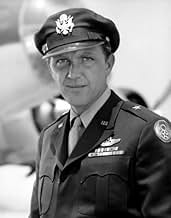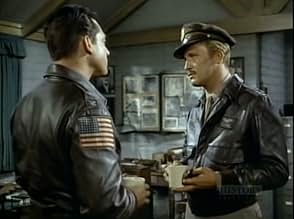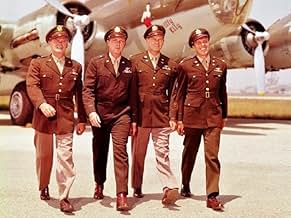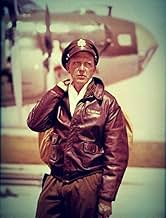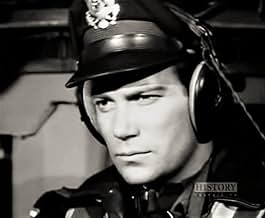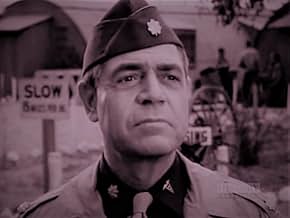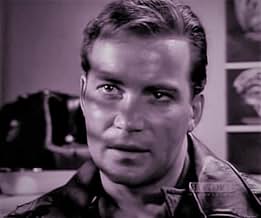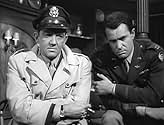12 O'Clock High
- Série télévisée
- 1964–1967
- 1h
NOTE IMDb
8,1/10
1,6 k
MA NOTE
Ajouter une intrigue dans votre langueA WWII bomb group commander must fill the shoes of his predecessor and get the performance rating up to snuff. He struggles with his own men, until he is able to develop pride in the group a... Tout lireA WWII bomb group commander must fill the shoes of his predecessor and get the performance rating up to snuff. He struggles with his own men, until he is able to develop pride in the group and win the men over, but at a cost to him.A WWII bomb group commander must fill the shoes of his predecessor and get the performance rating up to snuff. He struggles with his own men, until he is able to develop pride in the group and win the men over, but at a cost to him.
- Récompensé par 1 Primetime Emmy
- 2 victoires et 2 nominations au total
Parcourir les épisodes
Avis à la une
'Twelve O'Clock High', the television version of Gregory Peck's classic war film, was a remarkable achievement when it debuted, in 1964. While utilizing stock war footage for bombardment and dogfight scenes, the story lines addressed the timeless issues of warfare (heroism and cowardice, integrity, loyalty) on an intimate scale that 'the big screen' couldn't match. It also made a star of Robert Lansing, the rugged, pensive actor who had previously garnered rave reviews in the series, '87th Precinct'. His 'Frank Savage' was a man of courage and a conscience, and he lifted each episode far above the 'typical' TV war show of the era.
With a soaring, beautiful theme (by the versatile Dominic Frontiere), the strong production values of Quinn Martin, and a veteran supporting cast including Frank Overton and John Larkin, the series garnered rave reviews, and was poised for a long, award-winning 'life' on the small screen.
Unfortunately, ABC stepped in, however, and decided to 'improve' the series...
The network produced figures that indicated that younger audiences weren't watching in big enough numbers, and that the show didn't provide enough 'action' for fans craving battle scenes. Lansing wasn't 'pretty' enough to attract female viewers, and there were no 'hunky' co-stars to fill the gap. As for offering a 'Message'? Sure, that was okay...as long as it didn't interfere with the bullets flying, the plane crashes, and the mostly happy endings.
So the program was retooled for the second season. Robert Lansing was killed off, shot down over Europe, and Paul Burke was brought in as his replacement. Best known from the cop show, 'Naked City', Burke was actually two years older than Lansing, but he had a more 'classic' leading man 'look', and had gotten a lot of female fan mail during the run of the earlier show. Most of the older cast also got the ax, and young Chris Robinson was brought in, as another potential 'heartthrob'.
The result of the changes was a diluted show, with less 'heart', if more 'glamor' and 'action'. While Burke tried to provide Lansing's subtlety and depth, he simply wasn't as good an actor, and the series lost the very qualities that had made it, initially, so memorable.
When 'Twelve O'Clock High' was canceled, after struggling through two seasons with the new cast, ABC downplayed the event, choosing to ignore the fact that the series had begun so promisingly, and that they had 'killed' it.
But for those of us who remember that first season with fondness, it is a reminder that creative minds make 'Classic TV', not network demographics!
With a soaring, beautiful theme (by the versatile Dominic Frontiere), the strong production values of Quinn Martin, and a veteran supporting cast including Frank Overton and John Larkin, the series garnered rave reviews, and was poised for a long, award-winning 'life' on the small screen.
Unfortunately, ABC stepped in, however, and decided to 'improve' the series...
The network produced figures that indicated that younger audiences weren't watching in big enough numbers, and that the show didn't provide enough 'action' for fans craving battle scenes. Lansing wasn't 'pretty' enough to attract female viewers, and there were no 'hunky' co-stars to fill the gap. As for offering a 'Message'? Sure, that was okay...as long as it didn't interfere with the bullets flying, the plane crashes, and the mostly happy endings.
So the program was retooled for the second season. Robert Lansing was killed off, shot down over Europe, and Paul Burke was brought in as his replacement. Best known from the cop show, 'Naked City', Burke was actually two years older than Lansing, but he had a more 'classic' leading man 'look', and had gotten a lot of female fan mail during the run of the earlier show. Most of the older cast also got the ax, and young Chris Robinson was brought in, as another potential 'heartthrob'.
The result of the changes was a diluted show, with less 'heart', if more 'glamor' and 'action'. While Burke tried to provide Lansing's subtlety and depth, he simply wasn't as good an actor, and the series lost the very qualities that had made it, initially, so memorable.
When 'Twelve O'Clock High' was canceled, after struggling through two seasons with the new cast, ABC downplayed the event, choosing to ignore the fact that the series had begun so promisingly, and that they had 'killed' it.
But for those of us who remember that first season with fondness, it is a reminder that creative minds make 'Classic TV', not network demographics!
This was a not only a thinking man's series about WWII but also one that had a psychological approach to the fatigue and emotional stress that these men had to face in the line of duty. This was one of the best if not the greatest television shows of its day that depicted the outcome of the challenges of the 918th Bombardment Group of the United States Air Force during the horrors of battle in WWII.
When "Twelve O'Clock High",premiered on ABC in the fall of 1964,it was like a show unlike no other since it was based on the classic 1949 war film that starred Gregory Peck. The television show was a remarkable achievement that lasted three years on the air from 1964 until 1967,and produced 78 episodes,with the last 17 episodes in color in its final season. The black and white episodes lasted only two seasons from 1964 until 1966,while the color episodes ran from 1966 until 1967(the 61 episodes were in black and white from 1964-1966;the 17 episodes were in color from 1966-1967,in its final season). "Twelve O'Clock High" was head and shoulders above its competition and it is ranked to "Combat!" as one of the most intense dramas to ever depict about the horrors and scars and emotional traumas in the line of duty,that was World War II. While utilizing stock war footage for bombardment and astounding dogfight scenes,the brilliant story lines really addressed the timeless issues of the warfare and the effects on some of the individuals who were in the line of battle both on the ground and in the air. Issues and subject matter like heroism and cowardice,and integrity along with compassion and commitment were the order of the day. And it was brought to life on a intimate scale.
It also made a huge star out of actor Robert Lansing as General Frank Savage. His character during the first two seasons of the show brought more depth and integrity to the character than any other actor I have ever seen and it shows in the earlier episodes of the series. With a beautiful soaring theme by composer Dominic Frontiere,the strong production values of legendary producer Quinn Martin("The Untouchables", "The Fugitive","The FBI","The Invaders")along with long time QM associates Charles Larson,Phillip Saltzman,and fellow executives Howard Alston,Adrian Samish,and John Conwell as well as the supporting cast of the series including Frank Overton,John Larkin,and Andrew Duggan. The series garnered rave reviews,and was poised for a long network run on the small screen. However,the network executives over at ABC stepped in to make improvements which killed it. When the program was retooled for the second season,Robert Lansing's character of General Savage was killed off.....reportedly his plane was shot down somewhere over in Europe in hostile German country(in a gripping second season opener episode titled "The Loneliest Place In The World",which aired on September 13,1965).
However,Paul Burke(from the 1950's cop show Naked City)was brought in as his replacement and from there the results to the changes really killed it. Paul Burke to me was never the right choice for the role and simply out he was not a very good actor. The show took even a major dive when the episodes were in color. When the show was cancelled in the summer of 1967,after struggling for two seasons with the new cast,the network downplayed this show just to ignore the fact the this series had promise after it received rave reviews and a Golden Globe Nomination during the first season of the series.
When "Twelve O'Clock High",premiered on ABC in the fall of 1964,it was like a show unlike no other since it was based on the classic 1949 war film that starred Gregory Peck. The television show was a remarkable achievement that lasted three years on the air from 1964 until 1967,and produced 78 episodes,with the last 17 episodes in color in its final season. The black and white episodes lasted only two seasons from 1964 until 1966,while the color episodes ran from 1966 until 1967(the 61 episodes were in black and white from 1964-1966;the 17 episodes were in color from 1966-1967,in its final season). "Twelve O'Clock High" was head and shoulders above its competition and it is ranked to "Combat!" as one of the most intense dramas to ever depict about the horrors and scars and emotional traumas in the line of duty,that was World War II. While utilizing stock war footage for bombardment and astounding dogfight scenes,the brilliant story lines really addressed the timeless issues of the warfare and the effects on some of the individuals who were in the line of battle both on the ground and in the air. Issues and subject matter like heroism and cowardice,and integrity along with compassion and commitment were the order of the day. And it was brought to life on a intimate scale.
It also made a huge star out of actor Robert Lansing as General Frank Savage. His character during the first two seasons of the show brought more depth and integrity to the character than any other actor I have ever seen and it shows in the earlier episodes of the series. With a beautiful soaring theme by composer Dominic Frontiere,the strong production values of legendary producer Quinn Martin("The Untouchables", "The Fugitive","The FBI","The Invaders")along with long time QM associates Charles Larson,Phillip Saltzman,and fellow executives Howard Alston,Adrian Samish,and John Conwell as well as the supporting cast of the series including Frank Overton,John Larkin,and Andrew Duggan. The series garnered rave reviews,and was poised for a long network run on the small screen. However,the network executives over at ABC stepped in to make improvements which killed it. When the program was retooled for the second season,Robert Lansing's character of General Savage was killed off.....reportedly his plane was shot down somewhere over in Europe in hostile German country(in a gripping second season opener episode titled "The Loneliest Place In The World",which aired on September 13,1965).
However,Paul Burke(from the 1950's cop show Naked City)was brought in as his replacement and from there the results to the changes really killed it. Paul Burke to me was never the right choice for the role and simply out he was not a very good actor. The show took even a major dive when the episodes were in color. When the show was cancelled in the summer of 1967,after struggling for two seasons with the new cast,the network downplayed this show just to ignore the fact the this series had promise after it received rave reviews and a Golden Globe Nomination during the first season of the series.
I recently had a chance to see this show again after many years. I thought that it was a great show before, and I feel the same way now (I refer to the Robert Lansing/season one show -- I agree completely with the comments that head this list).
Robert Lansing, and the writers, show how leadership happens, when the commander doesn't have the option of starting over with someone else. He knows that his unit is only as strong as the weakest member, and he uses his knowledge and his leadership ability to get his men to do their best, even when it may cost him personal popularity.
The combat scenes are well done, but so are the scenes when the airmen are back at the base, or off duty, in wartime England, socializing with the civilians before risking their lives on another day time bombing run deep into Germany.
Robert Lansing, and the writers, show how leadership happens, when the commander doesn't have the option of starting over with someone else. He knows that his unit is only as strong as the weakest member, and he uses his knowledge and his leadership ability to get his men to do their best, even when it may cost him personal popularity.
The combat scenes are well done, but so are the scenes when the airmen are back at the base, or off duty, in wartime England, socializing with the civilians before risking their lives on another day time bombing run deep into Germany.
It is truly fine to be among the fans and supporters of this fine old chestnut. I am also in my fifties, and I knew a lot of WWII vets when I was a kid. My father rebuilt the big airfield at Foggia in Italy and the pastor of the church I went to was a nose gunner in B-24's. I've known 17, 24, and 29 pilots. To them the series was right on the money.
I always liked Lansing's Savage better than Peck's, but none of you noticed that the first few episodes were written by the men who wrote the original novel. In most cases, that usually makes for high production values and attention to characterization. Lay and Bartlett had a good ear for the experience because they lived it.
I have used "The Men and the Boys" and "Golden Boy Had Nine Black Sheep" as teaching tools in my European history and American history classes. The kids generally take to them, once they get past them being in black and white.
When this comes out so I can put it alongside "Rawhide" on my shelves, I will truly be a happy man.
Bob Potter Wilmington, Delaware
I always liked Lansing's Savage better than Peck's, but none of you noticed that the first few episodes were written by the men who wrote the original novel. In most cases, that usually makes for high production values and attention to characterization. Lay and Bartlett had a good ear for the experience because they lived it.
I have used "The Men and the Boys" and "Golden Boy Had Nine Black Sheep" as teaching tools in my European history and American history classes. The kids generally take to them, once they get past them being in black and white.
When this comes out so I can put it alongside "Rawhide" on my shelves, I will truly be a happy man.
Bob Potter Wilmington, Delaware
The first season of 12 O'clock High was a credit to all involved. As a 10 year old watching in 1965 there was not enough action. However, the story lines were good and the acting and production seemed believable. You really felt an empathy for COL Savage as one of his planes and 10 men took a hit and went down in flames. Filming in Black & White added that "look" that was also the trade mark of that great TV series "Combat". It is a shame that Lansing did not get along with Quinn Martin (mentioned above) as the series went down hill when he left. I still recall the episode when he did'nt come back from a mission. Twelve O'clock High is a memorial to those Pilots and Aircrew of the US 8th/5th Air Force as the majority of the young men did not make it through to their 20 odd missions and return to the States. Imagine sitting in a B-17, cold and miserable, freezing to death for up to 8 hours or more then having to fly through the wall flak on that final run to the target. Being jumped by enemy fighters on the way in and out of the target with nowhere to hide. They were sitting ducks. The British gave up daylight Bombimg.
Regrads Pete H, Sydney, Australia
Regrads Pete H, Sydney, Australia
Le saviez-vous
- AnecdotesWhile trying to get sponsors for this series, the producers approached the Volkswagen executives and showed them the pilot show which featured actual bombing footage from the war. During the film, one of the executives recognized the plant that was being bombed as the Volkswagen plant which had made cars for the German Army at the time. He commented, "There goes our plant", and the executives then and there decided not to sponsor the show.
- GaffesThroughout the series, actors regularly smoked king-sized filter cigarettes, which didn't exist in WWII.
- ConnexionsFollows Un homme de fer (1949)
Meilleurs choix
Connectez-vous pour évaluer et suivre la liste de favoris afin de recevoir des recommandations personnalisées
- How many seasons does 12 O'Clock High have?Alimenté par Alexa
Détails
- Date de sortie
- Pays d’origine
- Langue
- Aussi connu sous le nom de
- Twelve O'Clock High
- Lieux de tournage
- Chino Airport - 7000 Merrill Avenue, Chino, Californie, États-Unis(Archberry Field exteriors.)
- Sociétés de production
- Voir plus de crédits d'entreprise sur IMDbPro
- Durée1 heure
- Couleur
- Rapport de forme
- 1.33 : 1
Contribuer à cette page
Suggérer une modification ou ajouter du contenu manquant

Lacune principale
By what name was 12 O'Clock High (1964) officially released in India in English?
Répondre

